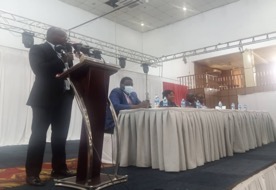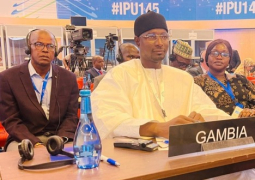
Funded by The Global Fund and the World Bank (WB) and partners, the project seeks to bring about greater efficiency and ensure quality data management in the country. The initiative comes at a time when countries are shifting from the old way of storing information, thereby adapting to a highly digitalised method, something the country can’t afford to miss.
To this end, the Directorate of the National Pharmaceutical Services last Wednesday began a three-day sensitisation for their partners, stakeholders and senior cadre of the Ministry on how they intend to implement the project in the coming months.
Welcoming the gathering, Babanding Sabally, the director of the National Pharmaceutical Services, described the initiative as a milestone achievement in the history of the Ministry and the country at large.
He recalled that some years ago the country first introduced the computerised inventory management system at the Central Medical Store.
“We all celebrated it as a breakthrough. Along the line, we realised that it is not responding to our needs anymore. Therefore, it calls for a more elaborate system. For the past, we’ve been struggling as to what system to adapt so as to address our data quality issues in the country most especially the Logistics Management Information Data.”
This move, he added, prompted them to come to the reality that they need to have an electronic version that would connect from end-to-end.
“We then came up with a proposal, sent it to our partners and thank God that our partners accepted it and are ready to fund it.”
Sabally expressed optimism that the introduction of the project would greatly revolutionalise way of doing business at the Ministry.
“We have far out-cried for the lack of a system where we would visualize from Central Medical Store to the last mile in the country. We are so excited at the Ministry of Health.”
Also speaking, Deborah Asante Luisier, Fund Portfolio manager for Global Fund, expressed optimism that the introduction of the project would help enhance data quality management system in the country.
“We look forward to being part of this since it is just at the beginning with our partners.”
Dr. Samuel Mills, Health Task Team Leader, World Bank, thanked the staff at the Ministry for embarking on that transformative journey, saying that is just the beginning of other transformative innovations in ensuring that they have a robust supply chain management system.
“From the World Bank side as you are aware, we supported several initiatives in the health sector. Since April 2020, the World Bank has allocated about US$135 million to initiatives in the health sector.”
The WB official reminded that in addition to the eLMIS project, there are several electronic projects in the pipeline, making reference to the civil and electronic birth registration system among others.
“So today we look forward to your inputs in ensuring that we have a successful roll-out of an effective and efficient Electronic Logistics Management Information System.”
Declaring the forum open, Momodou Lamin Jaiteh, permanent secretary at the Ministry on behalf of the minister, reminded that the Ministry is playing host to two high level partner missions in the country; a mission from Global Fund and World Bank, who are also in the country to assess the level of their partnership and implementation of their projects and programmes being funded by these two respective institutions.
“This particular workshop is one series of consultative engagement activities outlined for this mission period.”
PS Jaiteh described the initiative as an important one in the Ministry's drive to bring about greater efficiency towards ensuring greater accountability and quality service delivery.
He recalled that from time immemorial, the Ministry has been maintaining its logistics information system partially manual, acknowledging that there has been some computerisation.
“But we now live in a world where technology drives efficiency and The Gambia cannot be left behind.”





